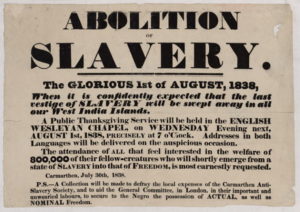Register for the Privy Council of Scotland third series vol. 25 March 1807 Was there slavery in Britain.
 The Abolition Of Slavery In Britain Historic Uk
The Abolition Of Slavery In Britain Historic Uk
Slavery Abolition Act 1833 in British history act of Parliament that abolished slavery in most British colonies freeing more than 800000 enslaved Africans in the Caribbean and South Africa as well as a small number in Canada.

When did slavery end in england. When did Britain end slavery. Most modern historians generally agree that slavery continued in Britain into the late 18th century finally disappearing around 1800. The abolition of slavery in the British Empire thus brought in a new era.
When did slavery end in England. After England began to have Norman lords wrote the monk Lawrence of Durham the English no longer suffered from outsiders that which they had suffered at their own hands. It received Royal Assent on August 28 1833 and took effect on August 1 1834.
The slave trade was actually abolished in 1807. This act gives all enslaved people in the Caribbean their freedom although some other British territories have to wait longer. Slavery ended in the British Empire after the Slavery Abolition Act came into play in 1833.
F we hear at all about Britains involvement in slavery theres often a slight whiff of self-congratulation for abolishing it in 1833 32 years ahead of. The colony of Rhode Island once had the highest percentage of enslaved people in New England and was a dominant player in the global slave. 1787 - The Society for the Abolition of the Slave Trade founded in Britain by Granville Sharp and Thomas Clarkson 1792 - Denmark bans import of slaves to its West Indies colonies although the law.
That dayJanuary 1 1863President Lincoln formally issued the Emancipation Proclamation calling on the Union army to liberate all enslaved people. Slavery Abolition Act is passed in Parliament taking effect in 1834. By the time William of Malmesbury was writing in the 1120s slavery was gone and at least some of his contemporaries were willing to give credit where it was due.
Slavery Persisted in New England Until the 19th Century. The judges of Edinburgh Scotland during the years 1662-1665 ordered the enslavement and shipment to the colonies a large number of rogues and others who made life unpleasant for the British upper class. It was now against the law for any British ship or British subject to trade in enslaved people.
However this did not happen in the other two Mid-Atlantic states New Jersey and Delaware. Before it was abolished British sailors became. Slavery was eventually abolished in all of the New England states and in the Mid-Atlantic states of New York and Pennsylvania.
Legislation was finally passed in both the Commons and the Lords which brought an end to Britains involvement in the trade. Until the 1730s London dominated the British trade in enslaved people. A Treasury so loose with its facts might explain something about the.
Because of the sheer size of London and the scale of the ports activities it is often forgotten that the capital was a major slaving centre. When the United States became a nation in 1776 all thirteen states had slavery. By 1st August 1838 this was finally achieved with full legal emancipation granted.
The bill received royal assent in March and the trade was made illegal from 1 May 1807. The 1833 Slavery Abolition Act abolished as the name suggests slavery itself. The Act to Abolish the Transatlantic Slave Trade is passed in Parliament.
It continued to send ships to West Africa until the end of the trade in 1807.


